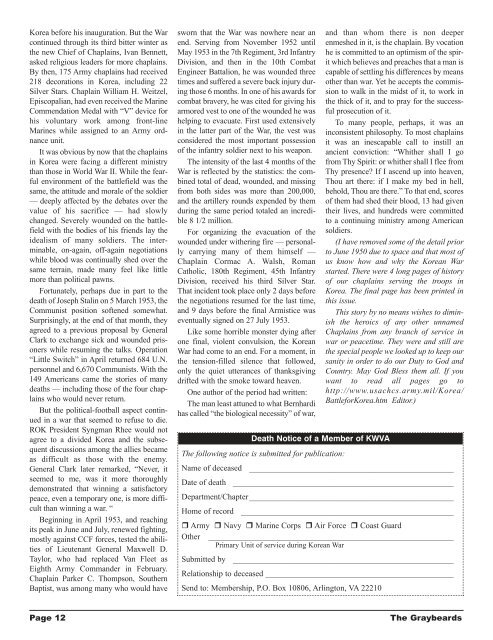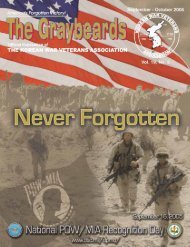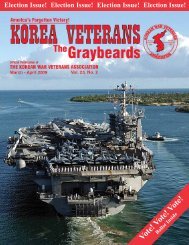The Graybeards - KWVA - Korean War Veterans Association
The Graybeards - KWVA - Korean War Veterans Association
The Graybeards - KWVA - Korean War Veterans Association
Create successful ePaper yourself
Turn your PDF publications into a flip-book with our unique Google optimized e-Paper software.
Korea before his inauguration. But the <strong>War</strong><br />
continued through its third bitter winter as<br />
the new Chief of Chaplains, Ivan Bennett,<br />
asked religious leaders for more chaplains.<br />
By then, 175 Army chaplains had received<br />
218 decorations in Korea, including 22<br />
Silver Stars. Chaplain William H. Weitzel,<br />
Episcopalian, had even received the Marine<br />
Commendation Medal with “V” device for<br />
his voluntary work among front-line<br />
Marines while assigned to an Army ordnance<br />
unit.<br />
It was obvious by now that the chaplains<br />
in Korea were facing a different ministry<br />
than those in World <strong>War</strong> II. While the fearful<br />
environment of the battlefield was the<br />
same, the attitude and morale of the soldier<br />
— deeply affected by the debates over the<br />
value of his sacrifice — had slowly<br />
changed. Severely wounded on the battlefield<br />
with the bodies of his friends lay the<br />
idealism of many soldiers. <strong>The</strong> interminable,<br />
on-again, off-again negotiations<br />
while blood was continually shed over the<br />
same terrain, made many feel like little<br />
more than political pawns.<br />
Fortunately, perhaps due in part to the<br />
death of Joseph Stalin on 5 March 1953, the<br />
Communist position softened somewhat.<br />
Surprisingly, at the end of that month, they<br />
agreed to a previous proposal by General<br />
Clark to exchange sick and wounded prisoners<br />
while resuming the talks. Operation<br />
“Little Switch” in April returned 684 U.N.<br />
personnel and 6,670 Communists. With the<br />
149 Americans came the stories of many<br />
deaths — including those of the four chaplains<br />
who would never return.<br />
But the political-football aspect continued<br />
in a war that seemed to refuse to die.<br />
ROK President Syngman Rhee would not<br />
agree to a divided Korea and the subsequent<br />
discussions among the allies became<br />
as difficult as those with the enemy.<br />
General Clark later remarked, “Never, it<br />
seemed to me, was it more thoroughly<br />
demonstrated that winning a satisfactory<br />
peace, even a temporary one, is more difficult<br />
than winning a war. “<br />
Beginning in April 1953, and reaching<br />
its peak in June and July, renewed fighting,<br />
mostly against CCF forces, tested the abilities<br />
of Lieutenant General Maxwell D.<br />
Taylor, who had replaced Van Fleet as<br />
Eighth Army Commander in February.<br />
Chaplain Parker C. Thompson, Southern<br />
Baptist, was among many who would have<br />
sworn that the <strong>War</strong> was nowhere near an<br />
end. Serving from November 1952 until<br />
May 1953 in the 7th Regiment, 3rd Infantry<br />
Division, and then in the 10th Combat<br />
Engineer Battalion, he was wounded three<br />
times and suffered a severe back injury during<br />
those 6 months. In one of his awards for<br />
combat bravery, he was cited for giving his<br />
armored vest to one of the wounded he was<br />
helping to evacuate. First used extensively<br />
in the latter part of the <strong>War</strong>, the vest was<br />
considered the most important possession<br />
of the infantry soldier next to his weapon.<br />
<strong>The</strong> intensity of the last 4 months of the<br />
<strong>War</strong> is reflected by the statistics: the combined<br />
total of dead, wounded, and missing<br />
from both sides was more than 200,000,<br />
and the artillery rounds expended by them<br />
during the same period totaled an incredible<br />
8 1/2 million.<br />
For organizing the evacuation of the<br />
wounded under withering fire — personally<br />
carrying many of them himself —<br />
Chaplain Cormac A. Walsh, Roman<br />
Catholic, 180th Regiment, 45th Infantry<br />
Division, received his third Silver Star.<br />
That incident took place only 2 days before<br />
the negotiations resumed for the last time,<br />
and 9 days before the final Armistice was<br />
eventually signed on 27 July 1953.<br />
Like some horrible monster dying after<br />
one final, violent convulsion, the <strong>Korean</strong><br />
<strong>War</strong> had come to an end. For a moment, in<br />
the tension-filled silence that followed,<br />
only the quiet utterances of thanksgiving<br />
drifted with the smoke toward heaven.<br />
One author of the period had written:<br />
<strong>The</strong> man least attuned to what Bernhardi<br />
has called “the biological necessity” of war,<br />
Death Notice of a Member of <strong>KWVA</strong><br />
and than whom there is non deeper<br />
enmeshed in it, is the chaplain. By vocation<br />
he is committed to an optimism of the spirit<br />
which believes and preaches that a man is<br />
capable of settling his differences by means<br />
other than war. Yet he accepts the commission<br />
to walk in the midst of it, to work in<br />
the thick of it, and to pray for the successful<br />
prosecution of it.<br />
To many people, perhaps, it was an<br />
inconsistent philosophy. To most chaplains<br />
it was an inescapable call to instill an<br />
ancient conviction: “Whither shall I go<br />
from Thy Spirit: or whither shall I flee from<br />
Thy presence? If I ascend up into heaven,<br />
Thou art there: if I make my bed in hell,<br />
behold, Thou are there.” To that end, scores<br />
of them had shed their blood, 13 had given<br />
their lives, and hundreds were committed<br />
to a continuing ministry among American<br />
soldiers.<br />
(I have removed some of the detail prior<br />
to June 1950 due to space and that most of<br />
us know how and why the <strong>Korean</strong> <strong>War</strong><br />
started. <strong>The</strong>re were 4 long pages of history<br />
of our chaplains serving the troops in<br />
Korea. <strong>The</strong> final page has been printed in<br />
this issue.<br />
This story by no means wishes to diminish<br />
the heroics of any other unnamed<br />
Chaplains from any branch of service in<br />
war or peacetime. <strong>The</strong>y were and still are<br />
the special people we looked up to keep our<br />
sanity in order to do our Duty to God and<br />
Country. May God Bless them all. If you<br />
want to read all pages go to<br />
http://www.usachcs.army.mil/Korea/<br />
BattleforKorea.htm Editor.)<br />
<strong>The</strong> following notice is submitted for publication:<br />
Name of deceased __________________________________________________<br />
Date of death ______________________________________________________<br />
Department/Chapter__________________________________________________<br />
Home of record ____________________________________________________<br />
Army Navy Marine Corps Air Force Coast Guard<br />
Other ____________________________________________________________<br />
Primary Unit of service during <strong>Korean</strong> <strong>War</strong><br />
Submitted by ______________________________________________________<br />
Relationship to deceased ______________________________________________<br />
Send to: Membership, P.O. Box 10806, Arlington, VA 22210<br />
Page 12<br />
<strong>The</strong> <strong>Graybeards</strong>

















